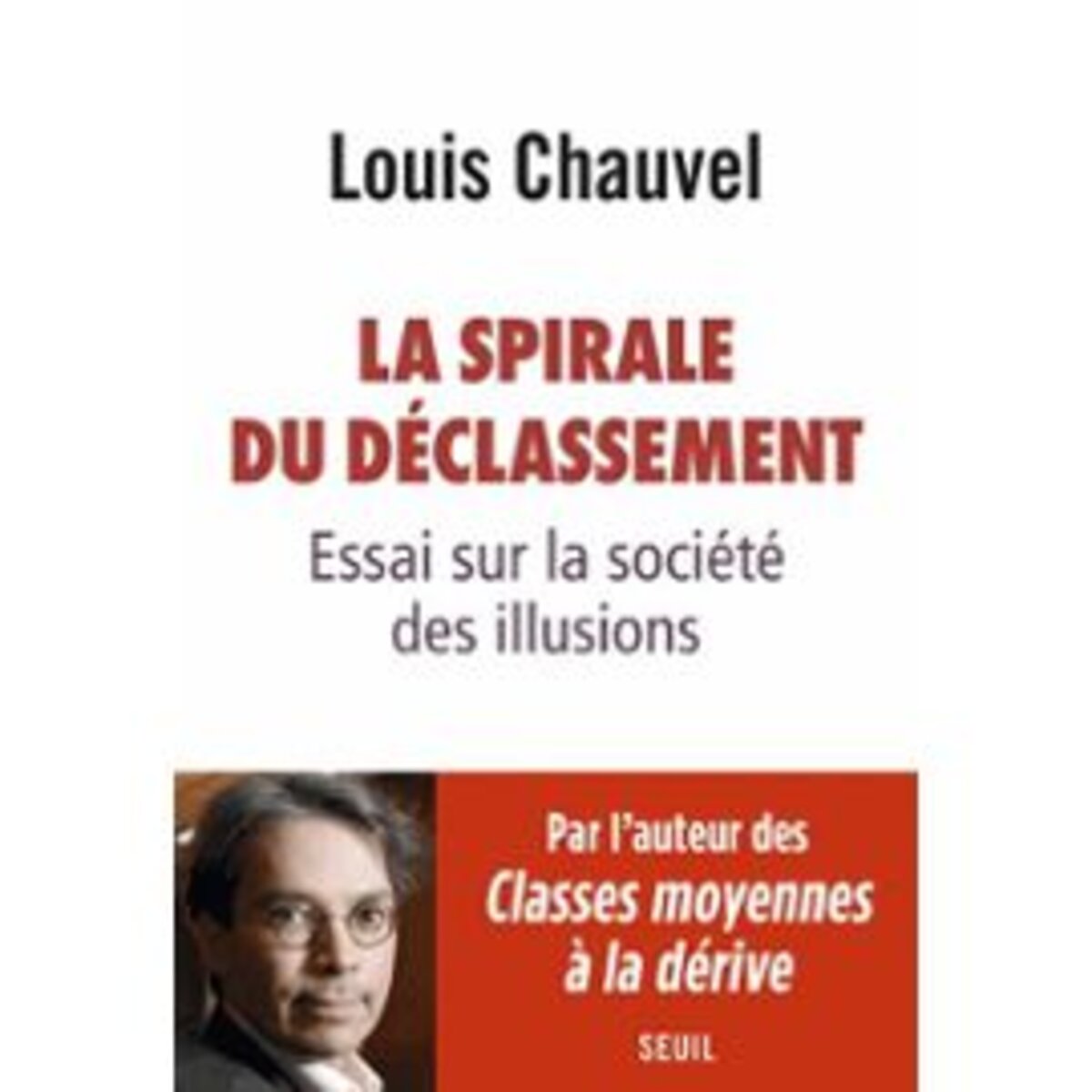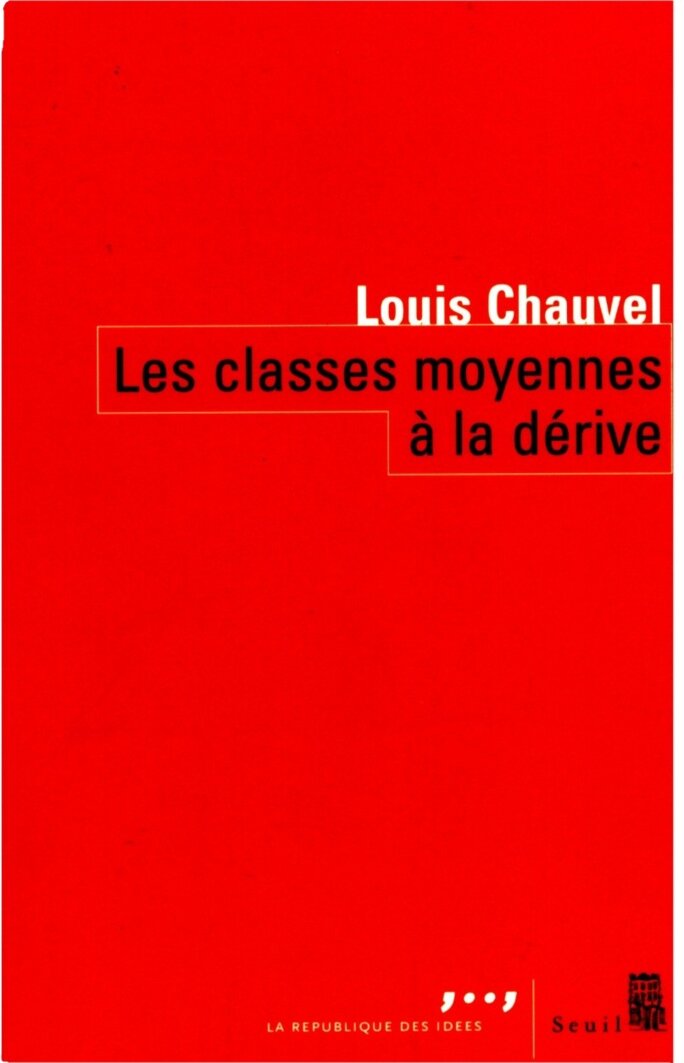The landmark book 'Collapse' by American biologist and author Jared Diamond was sub-titled 'How societies choose to fail or succeed'. Reading the latest book by French academic Louis Chauvel, La Spirale du déclassement. Essai sur la société des illusions ('The Downwards Spiral: Essay on a society of illusions'), published by Seuil, it seems as if French society is in the process of choosing to disappear. In the book Louis Chauvel, professor of sociology at the University of Luxembourg, cites grim forecasts of environmental collapse, judging that it is “right to extrapolate these ideas to the social environment”.

The academic warns that a “vicious circle, a negative spiral is developing, in France as in many post-industrial societies”, marked in particular by low growth, ever-deeper inequalities and the dependence, even submission, of young generations to the priorities of older people. In his view this approaching collapse has some similarity to the fate of Ancient Rome or, more recently, of Argentina in the 1930s. Though that South American country was then at the height of economic power, it has found itself demoted to the middle of world standings after a century of complete stagnation and a spiral of continual downgrading of people's status in society, comparable to what France is today experiencing.
As far as Louis Chauvel is concerned French society, like a liner with a corroded hull that cannot change course, is charting a journey towards a slow and painful shipwreck. His analysis may be less 'new' that he claims, as he picks up from his own research for two earlier works, Les Classes moyennes à la dérive ('The Middle Classes Adrift') (2006) and Le Destin des générations ('The Destiny of the Generations') (1998), as well as many other works on sociology and economics, in particular those of Thomas Piketty. But Chauvel is relentless in his analysis.
He highlights five “corrosive elements” that are undermining the foundations of the society that emerged from the 'Trente Glorieuses', that supposedly golden 30-year period after World War II in France. These are: the “dizzying growth in inequalities through the phenomenon of a renewed concentration of inherited wealth”; the “process of disintegration of the central core of society”; the “generational divisions and the disillusion that goes along with them”; the “systematic process of people's status being downgraded amid the dynamics of global inequality” amid the “fall of the former industrial powers”; and, finally, the decline in the “link between objective facts and how they are represented socially”. This decline, Chauvel argues, is the result of a “slowness to take account of new conditions in the world” and of the “outdated nature of a large majority of politicians and intellectuals who still live in a world that others have seen disappearing for thirty years”.
To those who claim that we live in a fluid society with winners and losers, the sociologist responds that we have entered a period of “vast inequality” in which the phenomenon of a renewed piling up of inherited wealth does not just signify a “growing handicap for those who only have their salary” but also highlights the “re-establishment of dynastic models of families where the management of inheritance is a defining dimension of inter-generational relations”. The growing inequalities thus lead to a “section of the middle classes and new generations following the working classes down the slope to impoverishment, bringing about a general spiral of downgrading in status”.
This spiral, which is becoming a vortex, is particularly acute for two categories of the population: the middle classes and younger generations. With the voting intentions of these two suffering segments of French society set to be among the key issues of the 2017 presidential campaign, Louis Chauvel starts by disagreeing with all those who hark back to the idea that the middle classes are not doing so badly, and that they have always expressed an “anxiety about losing status which constitutes part of their identity, if not their collective psychology”. In particular he lambasts economists Dominique Goux and Éric Maurin, authors of Nouvelles Classes moyennes (also published by Seuil), who take issue with Chauvel's earlier thesis that the middle classes are “adrift”.

Enlargement : Illustration 2

Indeed, Louis Chauvel insists that since his initial diagnosis in previous works the middle classes have now definitively lost their ties with the upper section of French society. “The image of sugar at the bottom of the coffee cup provides a good metaphor for the phenomenon: the upper part of society still seems intact but the continuous erosion of the submerged part heralds decomposition,” he writes.
The destabilisation of the middle classes is particularly worrying for at least two reasons, he says. On the one hand, even if their lot today remains less grim than that of the working classes, the “destabilisation of society's centre of gravity has more general impacts”. On the other, the middle classes can no longer represent a “centripetal dynamic where even antagonist groups – proletariat and bourgeois – are able to find reasons to take part in the building of a structure potentially open to all, in particular through inter-generational mobility”.
The author believes that inter-generational mobility is also in a parlous state, whether in terms of “standards of living, the effectivenesses of exam qualifications, changing consumer patterns, political representation”. Completing the diagnosis of the generational divide in French society that he had set out in Le Destin des générations, Louis Chauvel focuses in particular on the “residential relegation” that stops younger generations from being able to afford to live in dynamic areas where there are jobs. He highlights, too, the dead-end of an “indefinite proliferation of qualifications with no planning for the long-term and no consideration about the employability of those with qualifications”.
In this situation where, the academic says, a section of our contemporaries “plunder social resources that are not renewable and thus undermine the collective future of generations to come”, we are now experiencing the “political alienation of new generations”, who are already long-term absentees from political institutions, as shown by the ageing of MPs in the National Assembly. In 1981 there were two MPs under the age of 45 for every MP aged over 60; today the situation is reversed with just one MP under 45 for every two MPs over the age of 60. “The future generations don't vote even though we are playing with their futures,” writes Chuavel.
'Wall of denial'
How can one explain the lack of social reaction faced with a situation where the vertical nature of socio-economic power looks more and more like an insurmountable cliff? “The relationship between the objectively experienced situation and the subjective world of inequalities is not necessarily stable or coherent, not by any means,” notes Louis Chauvel. He think that in the face of these “new realities” the notion of “social consciousness” is “either obsolete – old Marxism is reappearing – or non-existent; the belief that we are still and will always be in an egalitarian society of middle class employees”.
It should be noted there has been a constant drop in social conflict in recent decades. In the 1970s two million working days a year were given over to strike action, against just 75,000 a year at the start of the 2010s. Some argue that social issues have disappeared because of a general increase in wealth, others claim it is because people fear the consequences of strikes in an age of mass unemployment, which puts a brake on all collective action. Louis Chauvel meanwhile says the phenomenon is a result of the way unions have been institutionalised and the fact that the memory of workers' struggles and organisational know-how has not been passed down from one generation to another.
But above all, says the author, the absence of mass labour movements is due to the difficulty of “reorganising 'class consciousness' that is capable of giving social groups a soul, life and a desire for political action”. Louis Chauvel takes up the old Marxist distinction between a class “in itself” (when people develop a consciousness of themselves as belonging to a particular social class) and a class “for itself” (where people act upon that class awareness to produce social change) to highlight the importance of the “structural identity” of social groups.
According to the sociologist, this identity is made up of three forms. These are: “temporal identity” which designates the permanence of the category and its resistance to generational, matrimonial or geographical change; the “cultural identity”, which is formed by a “sharing of specific, symbolic references, of lifestyles and ways of doing things that allow for shared knowledge”; and finally “collective identity”, which is the “ability to act collectively, in a conflictual way in relation to other social categories in the political arena, in order to recognise the unity of that class and its interests”.
The author concedes that this absence of great collective action hasn't stopped the outbreak of the “disturbances and revolts of the present time”. But Chauvel argues that the disconnect between objective inequalities and the subjective awareness of social domination today seems too strong to allow the building of a structure and a mobilisation that is capable of stopping the fundamental movements that are now overwhelming French society.
On top of this difficulty there is also the fact that we are facing what Louis Chauvel calls a “wall of denial”. The situation is now so serious, he says, that we would prefer not to see it, in a “process of delusion which starts when reality becomes unpleasant and intolerable”. This wall of denial seems all the steeper and impassable because the deepening of inequalities has led to the well-off and privileged classes becoming overprotected, and thus unable to understand the process of abandonment that is under way among the working classes, the middle classes and younger generations. And therefore unable to take action as a result. “Those whose actions could have been decisive are so protected that they will only see the final collapse at the last moment, remaining deaf to the testimonies of the famine and pillage suffered by the little people,” writes the sociologist, recalling that “aristocratic Roman families lived in the comfort of their villas in Latium until the final moment of pillage, which they had not wanted to see coming.”
Is it, then, time to fight against this process which will “eventually doom that which was our ideal of society, that of a 'middle class civilisation' confident in its ability to pass an improving world on to later generations”? Reading Louis Chauvel, it seems almost too late to take action, even if he reserves the use of the conditional tense for his most pessimistic comments. According to him, the social rights that have been acquired over many decades are set to unravel with, in time, the “collapse of entire sections of what one thought was as solid as a rock”.

Louis Chauvel's book barely goes beyond cold and discouraging analysis. Even though he calls for the “imperative of responsibility”, developed by German philosopher Hans Jonas in the domain of the environment, to be applied to society on behalf of future generations, he takes little interest in the ways in which it might eventually be possible to change the doomed course set by French society.
His only suggestion is to revive a vanished ritual from ancient Italy, the “ver sacrum” or “Sacred Spring”. This was when, faced with a calamity sent by the gods or fate, a society conferred a part of its livestock and wealth on selected young people who were then were sent off on their own, and who were thus forced to “rebuild everything, to reinvent even the basics of their collective existence”.
This reference to an ancient practice faced with an impossible situation bears similarities to a proposition made by American anthropologist David Graeber in his book 'Debt: The first 5,000 years', published by Melville House in 2011. He suggested taking inspiration from the ancient Mesopotamian practice where, in a bid to avoid prevent complete social breakdown, rulers would periodically “wipe the tablets clean” and clear the debts of people who had suffered too much from having pawned their animals, fields and even their children.
----------------------------------------------------------------------------
- The French version of this article can be found here.
English version by Michael Streeter


